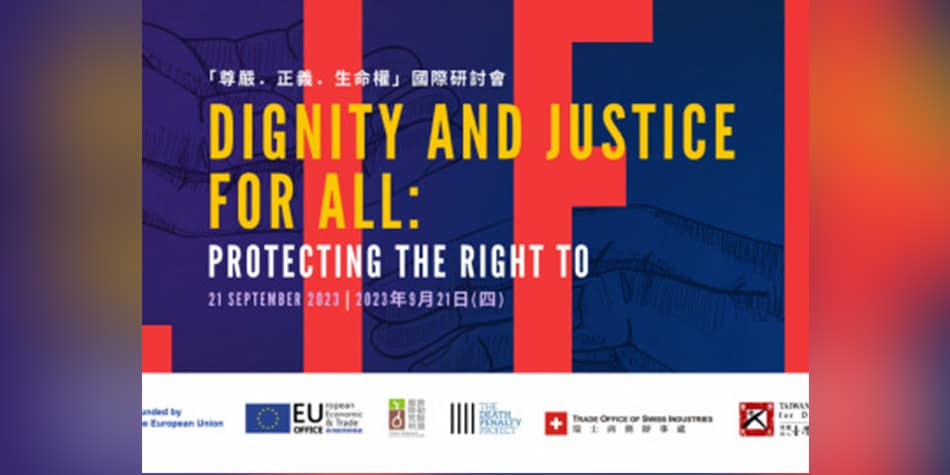
Notes on the Supreme Court Trial in the Chen Fu-hsiang Case: Life or Death Debates in the Style of ChatGPT
Advocacy
Article first published in april on TAEDP’s website
Return of life or death debates
Following the previous oral arguments on death penalty cases at the Supreme Court in 2021, another life or death debate took place in April this year. This time, I had the opportunity to attend the oral arguments of the “Chen Fu-hsiang death penalty case” at the Supreme Court. Unlike the usual setup with teams from both the defense and prosecution, there was only one lawyer and one prosecutor present in court this time.
The Chen Fu-hsiang case is a very significant one. It was the first case to require presentence investigation during a trial of the facts, setting a new precedent (Supreme Court Criminal Judgment No. 480, Year 2018). This requirement for presentence investigation procedures that we often see in the handling of most death penalty cases today was established by the Chen Fu-hsiang case when it was first appealed to the Supreme Court (Supreme Court Criminal Judgment No. 480, Year 2018). The case is significant because it marks a departure from the court’s old approach of basing life or death decisions solely on the defendant’s previous case records, educational background, and a few emotional statements like “outrageous to both humanity and divine justice.” Instead, it enables a more comprehensive evaluation of the defendant’s sentence by considering their personal circumstances and conducting investigations into various factors. This approach ensures that defendants are not perceived as isolated offenders.
Here are some excerpts from the first judgment issued by the Supreme Court in the Chen Fu-hsiang case:
When the court considers the sentence or treatment plan for a defendant, it relies on investigators to provide relevant and necessary information beyond the elements of the defendant’s crime. The investigation into these circumstances involves a wide range of factors, including the defendant’s character, family background, life experiences, upbringing environment, motive for the crime, psychological state after the crime, personal risk, prediction of recidivism, and even future treatment options and their effectiveness. Such investigation encompasses multiple fields, such as psychology, criminology, sociology, and psychiatry, necessitating the involvement of professionals like psychologists, doctors, social workers, and probation officers. They conduct comprehensive team investigations prior to the judgment in order to provide the court with objective grounds for determining the appropriate level of punishment and treatment. This approach helps avoid the subjective bias that may arise when relying solely on a single investigator.
The court recognizes the importance and necessity of conducting thorough presentence investigations before sentencing, and stresses the need for the presentence investigations to be carried out by a professional “interdisciplinary team.” This is done to avoid any bias that may arise from relying on a single investigator. In other words, a simple psychological evaluation, which was sufficient in the past, is no longer satisfactory. Instead, comprehensive investigations that incorporate expertise from different professional fields are now required to ensure a fair and accurate assessment.
The Supreme Court, currently under renovation, is conducting life or death debates in a death penalty case. Photo credit: Taiwan Alliance to End the Death Penalty
Improper trial of the facts
The Supreme Court has sent this case back to the High Court three times, highlighting numerous unresolved issues in the investigation. The recurring concern in all three remands is the need for “cross-disciplinary team presentence investigations during the trial of the facts.” However, the High Court has been stubborn and refused to comply, consistently imposing the death penalty on the defendant. The most recent trial judgment in this case (the third trial) is particularly perplexing. It acknowledges the possibility of the defendant’s rehabilitation but refuses to conduct presentence investigations, resulting in a death sentence. It is truly puzzling.
This matter has once again reached the Supreme Court, and during the recent court hearing, three main points of contention were addressed:
1. Whether the murder committed by the appellant falls under the category of “most serious crimes” as stated in Article 6, paragraph 2 of the International Covenant on Civil and Political Rights.
2. Whether the original judgment, which sentenced the appellant to death for the murder, contained any illegal or inappropriate elements in determining the sentencing factors (such as motive for the crime, post-crime attitude, possibility of rehabilitation, etc.).
3. Whether there are any other compelling reasons, based on the specific circumstances and personal situation of the appellant’s crime, to conclude that the death penalty should not be imposed in this case.
Seeking answers from ChatGPT
The issues of “most serious crimes,” “possibility of rehabilitation,” and “sentencing illegality” keep coming up and has been a matter of discussion for a long time. As Taiwan gradually incorporates international human rights conventions into its laws, the fundamental question at hand is whether the death penalty should be imposed by the state.
However, during the debate process, both the prosecution and defense seemed to recite their prepared statements like students reading from textbooks. If we listen closely, phrases like “the crime is (not) the most serious” and “(no) possibility of rehabilitation” are mostly clichés that even ChatGPT could respond to. Occasionally, they inserted a few weak statements like “outrageous to both humanity and divine justice,” “imposing death sentences showcases the dignity of the law and upholds justice,” and “abolishing the death penalty is not a matter of right or wrong but falls within the realm of freedom of speech.” The overall process was conducted in a formal manner, from reading out the case background to concluding the debates, and without any questions coming from the judges. The session ended in less than an hour after the prosecutor’s final summary statement quoting the victim’s family members, who expressed their belief that “the government should not abolish the death penalty according to party guidelines” and that “imposing death sentences is necessary to gain the people’s trust in the judiciary.”
In the Chen Fu-hsiang case, the Supreme Court’s Criminal Judgment No. 480, Year 2018, established the need for conducting presentence investigations in similar cases. This has allowed subsequent death penalty cases to carry out more detailed investigations during the sentencing phase. It’s important to avoid focusing only on the “possibility of rehabilitation” in death penalty sentencing for high-profile murder cases in society, because this practice may disregard the existing provisions in our country’s criminal law, particularly Article 57, which involves investigations and the evaluation of factors such as the individual characteristics of the perpetrator. Eventually, it would become challenging to fully assess the sentencing in individual cases.
Uncertainty Surrounding Life and Death
When the case reached the Supreme Court, there was hope that solid debates would take place in the courtroom. Important topics were expected to be discussed, including “proper procedures for presentence investigations,” the “three-stage framework for death penalty judgments,” the “role of the perpetrator’s individual characteristics in mitigating sentencing,” “application of the single-factor exclusion method* to the most serious crimes,” and even the “constitutionality of the death penalty” under the constitutional review system. In fact, these issues have become essential criteria through judicial practice for limiting death penalty judgments; however, to everyone’s disappointment, they were not addressed or resolved in the third trial judgment. The debates devolved into non-debates, leaving the crucial matters unresolved.
The presiding judge announced the end of the entire debate, and the verdict was scheduled to be announced on May 2nd at 2:30 p.m.
As the proceedings adjourned, rain began to fall from the sky.
Editor’s note: On May 2, 2023, the Supreme Court sentenced Chen Fu-hsiang to life imprisonment and permanently deprived him of his civil rights. After a comprehensive review of the case files, the Supreme Court concluded that Chen Fu-hsiang’s act of killing was impulsive, not premeditated, and the shooting was carried out from a distance rather than at close range. The original judgment failed to provide a strict interpretation of the “most serious crimes” as defined by the international conventions regarding Chen Fu-hsiang’s actions. As a result, the original judgment was overturned, and a new judgment was made. (Source: News release on the Chen Fu-hsiang murder case, Supreme Court, Case No. 1046, Year 2023)
*Translator’s note: Currently applied in Taiwan, this method involves abandoning the issuance of a death sentence solely based on a single factor that does not meet the criteria for “the most serious crimes.”
Photo credit: Taiwan Alliance to End the Death Penalty
Categories
Taiwan






